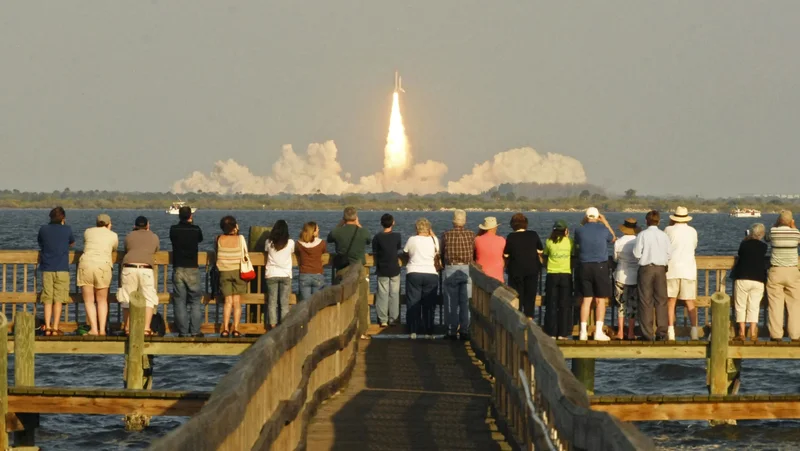Cape Canaveral's Rocket Launch Double: What Happened and Why It Matters
Dr. Thorne: SpaceX's Double Launch – A Glimpse into Our Rapidly Approaching Future
Alright, folks, buckle up because what SpaceX just pulled off is more than just a couple of rocket launches. It's a freakin' symphony of engineering, logistics, and sheer audacity that points directly towards a future where space travel is as routine as catching a flight to, say, the Bahamas. I mean, two Falcon 9 rockets launching within four hours of each other from the same space coast? That's not just impressive; it's paradigm-shifting.
Let's break this down. On November 14th, 2025, SpaceX launched a pair of Falcon 9 rockets carrying 29 Starlink V2 Mini satellites each. The first took off from Pad 39A at Kennedy Space Center at 10:08 p.m. EST, followed by another from Cape Canaveral Space Force Station at 1:44 a.m. EST. Both missions went off without a hitch, with the first stage boosters landing safely on drone ships in the Atlantic. What does this tell us? Well, for starters, it showcases SpaceX's mastery over reusable rocket technology. The booster used for the Starlink 6-85 mission, B1078, flew for a staggering 24th time! Just think about that for a second. It’s like having an airliner that's flown nearly two dozen round trips – talk about maximizing efficiency.
The Big Idea: Routine Access to Space
The real story here isn't just about launching satellites; it’s about the implications of making space access routine. What if we could launch research payloads on demand, deploying new telescopes and instruments at a fraction of the current cost? Imagine the discoveries we could unlock! And it’s not just about science. Reliable and frequent launches pave the way for space-based manufacturing, asteroid mining, and, yes, even lunar and Martian settlements.
This reminds me of the invention of the printing press. Before Gutenberg, knowledge was painstakingly copied by hand, making books rare and expensive. The printing press democratized information, sparking the Renaissance and fueling the scientific revolution. Similarly, SpaceX's rapid launch cadence promises to democratize space, opening up a universe of possibilities for innovation and exploration.

But here’s the thing: with great power comes great responsibility. As we expand our presence in space, we need to be mindful of the potential for orbital debris, resource exploitation, and even the weaponization of space. It’s crucial that we establish clear ethical guidelines and international agreements to ensure that space remains a domain for peaceful exploration and collaboration.
Now, I know some folks might be skeptical. I saw one headline that read, "SpaceX Overloads Orbit with Starlink Satellites." Sure, there are concerns about overcrowding and potential interference with astronomical observations. But let's reframe that, shall we? The Starlink constellation is providing internet access to underserved communities around the globe, bridging the digital divide and empowering people with information and opportunity. And SpaceX is actively working on solutions to mitigate the impact on astronomy, such as darkening the satellites and developing new observation techniques.
What this means for us is a future where internet access is truly ubiquitous, where remote education and telemedicine are readily available, and where disaster relief efforts can be coordinated more effectively. But more importantly, what could it mean for you? What new opportunities will arise from a world that is seamlessly connected, no matter where you are?
I took a peek into some Reddit threads to gauge the public's reaction, and the overwhelming sentiment is one of excitement and optimism. One user wrote, "This is just the beginning. Imagine what we'll be able to do in the next decade!" Another commented, "SpaceX is making science fiction a reality." And that, my friends, is exactly the point. This isn't just about rockets and satellites; it's about inspiring a new generation of scientists, engineers, and explorers to dream big and push the boundaries of what's possible.
This Changes Everything
SpaceX's double launch isn't just a technological feat; it's a beacon of hope, illuminating a future where humanity is a multi-planetary species.
-

Warren Buffett's OXY Stock Play: The Latest Drama, Buffett's Angle, and Why You Shouldn't Believe the Hype
Solet'sgetthisstraight.Occide...
-

The Business of Plasma Donation: How the Process Works and Who the Key Players Are
Theterm"plasma"suffersfromas...
-

The Great Up-Leveling: What's Happening Now and How We Step Up
Haveyoueverfeltlikeyou'redri...
-

NJ's ANCHOR Program: A Blueprint for Tax Relief, Your 2024 Payment, and What Comes Next
NewJersey'sANCHORProgramIsn't...
-

The Future of Auto Parts: How to Find Any Part Instantly and What Comes Next
Walkintoany`autoparts`store—a...
- Search
- Recently Published
-
- NVDA Earnings: What to Expect and When – The Future is Coming
- Pump.fun: Price predictions and... why?
- Microsoft Stock: Price Trends and Investor Sentiment
- SpaceX Launch Today: What We Know and the Schedule – A New Dawn
- Nvidia Stock Price Today: What's Happening and Why You Should Probably Panic
- XRP Price: Whale Activity, Predictions, and What's Next
- Firo Hard Fork: What It Means and the Road Ahead
- Gabe Newell's Gigayacht: Net Worth, Steam Deck, and the Internet's Reactions
- Caldera: No Impact on Youth? Yeah, Right.
- Starknet Token Price Surge: What's Behind the Rally?
- Tag list
-
- carbon trading (2)
- Blockchain (11)
- Decentralization (5)
- Smart Contracts (4)
- Cryptocurrency (26)
- DeFi (5)
- Bitcoin (29)
- Trump (5)
- Ethereum (8)
- Pudgy Penguins (5)
- NFT (5)
- Solana (5)
- cryptocurrency (6)
- XRP (3)
- Airdrop (3)
- MicroStrategy (3)
- Stablecoin (3)
- Digital Assets (3)
- PENGU (3)
- Plasma (5)
- Zcash (6)
- Aster (4)
- investment advisor (4)
- crypto exchange binance (3)
- SX Network (3)
